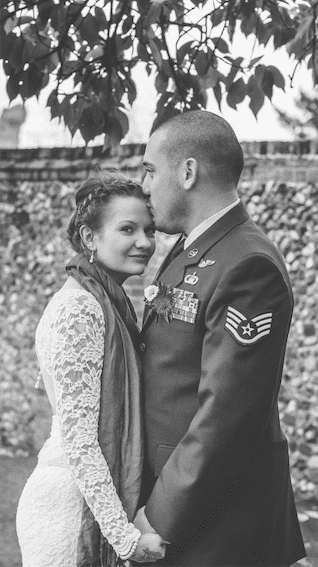When I married my husband, who is in the US Air Force, I knew life would be tough as a military wife, but I had not realized how much harder it would be with my newly-diagnosed mental health condition – bipolar disorder type 1.
I met my husband in England whilst he was stationed overseas, and as an English woman, I fell in love with the American who loved Harley Davidsons and said yes maam. It was wonderfully romantic, with a proposal in Italy, and we were married just over six months later.
A few months after we were married, my husband received orders to go back to the States permanently. I was very excited and although preparing to move our lives to the other side of the world was stressful, I couldnt wait to get there.
Once we were in our new home, I began to explore. Everything was so new even crossing the road was different. I felt my anxiety grow as even just the simplest things had changed so much. I was in a completely different world.
During the stress of the move, I had forgotten to take my medication for over a week and I inevitably started to feel unwell. I became very anxious and down. I began hearing and seeing things. I even thought the neighbors were spying on me.
Eventually I broke down and told my husband. He took me to the emergency room.
I stayed in hospital for 6 days and although I was feeling much better by the time I got out, it took me months to completely come out of the psychotic depression I had fallen into. It really affected my ability to start to acclimatize in my new home and country.
I felt so guilty about the extra burden I had put on my husband, only a few weeks after we had moved. He was always very supportive, however, and after this, things did improve for a little while. I learned to drive on the other side of the road and took my drivers test. I made some good friends and enjoyed the summer.
Later in the year, however, it was time for my husband to depart for a three-month deployment. After he left, I quickly became very lonely, and just stayed in my house. I stopped making the effort to take care of myself and became very depressed again. After finding things just too much to cope with, I relapsed and ended up back in hospital.
Having this happen while he was away was very stressful for both of us. Luckily we were able to have a daily phone call, but I just cried down the phone most of the time. It was a really terrible time.
Eventually my husband returned home. It was an emotional reunion and as I lifted out of the depression once again, I decided that this couldnt keep happening.
As a military wife, I was going to go through difficult times. I would be continuously put into new situations, and left alone for long periods of time. It wasnt going to change. I had to change.
I knew I couldnt control my illness completely, but I needed to learn to manage it better.
I started to read a lot more about bipolar, and I went to some support groups. I made it my project for a few months to learn as much as I could.
My husband helped me think of simple things I could do to take care of myself during difficult times, such as not being alone for long periods of time, keeping my schedule busy, and keeping in touch with friends.
With the help of a partial hospitalization program, I developed my own Wellness Recovery Action Plan, which helped with wellness tools, early warning signs, and relapse prevention. It is another way that I have become prepared and educated.
Although I felt like I had failed each time I had relapsed, those failures led me to a better understanding of my mental health condition.
Military life throws tough situations at you, but there are tough situations in everybodys life. Everyone can benefit from being ready for those times that are extra stressful, and from learning as much about themselves and their condition as possible.
I cant be sure I wont start to relapse again because that is the nature of my illness, but I can feel secure in knowing I have a plan to prevent it from getting too serious, and for managing my way out of it.
I can feel excited for the future once again!


